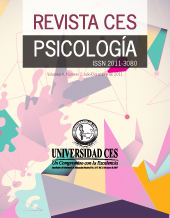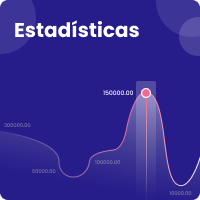Exploración de la dimensionalidad y las propiedades psicométricas de la Escala de Inteligencia Emocional -EIS-
DOI:
https://doi.org/10.21615/cesp.12.3.4Palabras clave:
Inteligencia emocional, Evaluación de la inteligencia emocional, Bienestar afectivo, Habilidades sociales, Escala de Inteligencia EmocionalResumen
El presente trabajo tiene por objetivo la adaptación de la Escala de Inteligencia Emocional -EIS- (abreviatura por su nombre en inglés Emotional Intelligence Scale) de Schutte et al. (1998) al idioma español, evaluando su consistencia interna, estructura factorial y validez y comparando tres modelos de medición de la Escala en una muestra de 1153 personas de origen español (48.83% hombres; M edad=29.32 años). El estudio comprendió dos fases: 1) se realizó la traducción de la EIS al español y se evaluó su consistencia interna, estructura factorial y validez convergente; y 2) se realizó el análisis factorial confirmatorio de la Escala. Los resultados apoyan la consistencia interna de la medida y apuntan a una estructura de seis factores de la inteligencia emocional: Atención a las propias emociones; Atención a las emociones de otros; Regulación de las propias emociones; Emoción expresada; Regulación de las emociones de otros; Emociones en la resolución de problemas. El análisis factorial exploratorio mostró claramente que los factores de la EIS presentan una varianza acumulada del 59,83%, mostrando su capacidad de explicar la variación de inteligencia emocional. Por su parte, el análisis factorial confirmatorio confirma la adecuación del modelo compuesto por seis factores identificados y 33 ítems. La EIS es un instrumento fácil de comprender y rápido de completar, por lo que se considera útil para la evaluación de la inteligencia emocional en población hispanohablante.
Descargas
Referencias bibliográficas
Aluja, A., Rossier, J., García L. F., Angleitner, A., Kuhl¬man, M. & Zuckerman, M. (2006). A cross-cultural shor¬tened form of the ZKPQ (ZKPQ-50-CC) adapted to En¬glish, French, German, and Spanish languages. Persona¬lity and Individual Differences, 41, 619–628.
Ato, M., y Vallejo, G. (2015). Diseños de investigación en Psicología. Madrid: Pirámide.
Batchelder, L., Brosnan, M., & Ashwin, C. (2017). The development and validation of the Empathy Components Questionnaire (ECQ). PLoS ONE, 12(1): e0169185. doi: 10.1371/journal.pone.0169185
Batista, J.M. & Coenders, G. (2000). Modelos de ecuaciones estructurales, Madrid: La Muralla.
Bisquerra, R. (2009). Psicopedagogía de las emociones. Madrid: Síntesis.
Boily, R., Kingston, S.E., & Montgomery, J.M. (2017). Trait and Ability Emotional Intelligence in Adolescents With and Without Autism Spectrum Disorder. Canadian Journal of School Psychology, 32(3-4), 282-298. doi: 10.1177/0829573517717160
Chan, D.W. (2004). Perceived emotional intelligence and self-efficacy among Chinese secondary school teachers in Hong Kong. Personality and Individual Differences, 36, 1781-1795. doi: 10.1016/j.paid.2003.07.007
Cook, C. R., Gresham, F. M., Kern, L., Barreras, R. B., Thornton, S., & Crews, S. D. (2008). Social skills training for secondary students with emotional and/or behavioral disorders: A review and analysis of the meta-analytic literature. Journal of Emotional and Behavioral Disorders, 16, 131–144. doi: 10.1177/1063426608314541
Fernández-Abascal, E., y Jiménez, M. P. (2000). Cien años de estudio para la emoción. Revista de Historia de la Psicología, 21(2), 707-717.
Fernández-Berrocal, P. y Ramos, N. (2002). Corazones inteligentes. Barcelona: Kairos.
Fernández-Berrocal, P., y Extremera, N. (2008). El papel de la Inteligencia Emocional en el alumnado: Evidencias empíricas. Revista Electrónica de Investigación Educativa, 6(2), 2004.
Herzberg, P.Y., & Brähler, E. (2006). Assessing the Big-Five personality domains via short forms: A cautionary note and a proposal. European Journal of Psychological Assessment, 22, 139–148. doi: 10.1027/1015-5759.22.3.139
Hu, L., & Bentler, P. M. (1999). Cutoff criteria for fit indexes in covariance structure analysis: Conventional criteria versus new alternatives. Structural Equation Modeling: A Multidisciplinary Journal, 6, 1–55. doi: 10.1080/10705519909540118
Karas, D., & Cieciuch, J. (2018). The relationship between identity processes and well-being in various life domains. Personality and Individual Differences, 121, 111-119. doi: 10.1016/j.paid.2017.09.027
Kinnaman, J.E.S. & Bellack, A.S. (2012). Social Skills, in O’Donohue, W. & Fisher, J.E. (eds.) Cognitive Behavior Therapy: Core principles for practice. Nevada: John Wiley and Sons.
Kotsou, I., Leys, C., & Fossion, P. (2018). Acceptance alone is a better predictor of psychopathology and well-being than emotional competence, emotion regulation and mindfulness. Journal of Affective Disorders, 226, 142-145. doi: 10.1016/j.jad.2017.09.047
Mayer, J. D., Salovey, P., Caruso, D. y Cherkasskiy, L. (2011). Emotional intelligence. En J. Stenberg, y B. Kaufman (Eds.), The Cambrige Handbook of intelligence (pp. 528-549). Cambrige: University Press.
Mayer, J. D., Salovey, P., y Caruso, D. (2000). Models of emotional intelligence. En Handbook of intelligence (pp. 396-420). New York: Cambridge.
Mayer, J. D., Salovey, P., y Caruso, D. R. (2008). Emotional intelligence: New ability or eclectic traits? American Psychologist, 63(6), 503-517.
Muñiz, J., Elosua, P., & Hambleton, R.K. (2013). International Test Commission. Guidelines for test translation and adaptation. 2nd Ed. doi: 10.7334/psicothema/2013.24
Nikooyeh, E., Zarani, F., & Fathabadi, J. (2017). The mediating role of social skills and sensation seeking in the relationship between trait emotional intelligence and school adjustment in adolescents. Journal of Adolescence, 59, 45-50. doi: 10.1016/j.adolescence.2017.05.012
Pekkar, K.A., Bakker, A.B., van der Linden, D., & Born, M.P. (2018). Self- and other-focused emotional intelligence: Development and validation of the Rotterdam Emotional Intelligence Scale (REIS). Personality and Individual Differences, 120, 222-233. doi: 10.1016/j.paid.2017.08.045
Petrides, K.V. (2012). Technical Manual for the Trait Emotional Intelligence Questionnaire (TEIQue). London Psychometric Laboratory, London.
Petrides, K.V. (2016). Four thoughts on Trait Emotional Intelligence. Emotion Review, 8(4), 345. doi: 10.1177/1754073916650504
Petrides, K.V., & Furnham, A. (2000). Gender Differences in measured and self-estimated trait emotional intelligence. Sex Roles, 42, 449-461.
Saklofske, D.H., Austin, E.J., & MInski, P. (2003). Factor structure and validity of a trait emotional intelligence measure. Personality and Individual Differences, 34, 707-721. doi: 10.1016/S0191-8869(02)00056-9
Salovey, P. y Mayer J. D. (1990). Emotional Intelligence. Imagination, Cognition and Personality, 9, 185-211.
Salovey, P. y Mayer J. D. (1990). Emotional Intelligence. Imagination, Cognition and Personality, 9, 185-211.
Schutte, N.S., Malouff, J.M., Hall, L.E., Haggerty, D.J., Cooper, J.T., Golden, C.J., & Dornheim, L. (1998). Development and validation of a mesure of emotional intelligence. Personality and Individual Differences, 25, 167-177.
Summerfeldt, L.J., Kloosterman, P.H., Antony, M.M., & Parker, J.D.A. (2006). Social anxiety, emotional intelligence, and interpersonal adjustment. Journal of Psychopathology and Behavioral Assessment, 28(1), 57-68. doi: 10.1007/s10862-006-4542-1
Tamir, M., & Gutentag, T. (2017). Desired emotional states: their nature, causes, and implications for emotion regulation. Current Opinion in Psychology, 17, 84-88. doi: 10.1016/j.copsyc.2017.06.014
Watson, D., Clark, L.A. & Tellegen, A. (1988). Development and validation of brief measures of positive and negative affect: the PANAS scales. Journal of Personality and Social Psychology, 54(6), 1063-1070.
Zeidner, M., Roberts, R. D., y Matthews, G. (2002). Can emotional intelligence be schooled? A critical review. Educational Psychologist, 37 (4), 215-231.
Zhoc, K.C.H., LI, J.C.H., & Webster, B.J. (2016). New reliability and validity evidence of the Emotional Intelligence Scale. Journal of Psychoeducational Assessment, 1, 16. doi: 10.1177/0734282916653901
Descargas
Publicado
Cómo citar
Número
Sección
Licencia
Derechos de autor 2019 CES Psicología

Esta obra está bajo una licencia internacional Creative Commons Atribución-SinDerivadas 4.0.
Revista CES Psicología ISSN 2011 3080
Facultad de Psicología, Universidad CES Primera edición 2008. Última actualización Mayo 29 de 2024. Todos los derechos reservados. Hecho el depósito legal que exige la ley.
Se autoriza la reproducción total o parcial de los artículos citando la fuente y el autor. This publication may be reproduced by mentioning the source and the authors.



